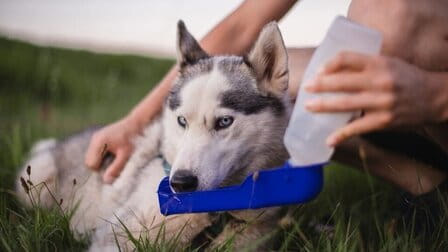Bone broth is a nutrient-rich, flavorful liquid made by simmering bones, vegetables, and herbs in water for an extended period of time. This traditional culinary staple has been used for centuries in various cultures as a medicinal and nutritional supplement. In recent years, bone broth has gained popularity as a healthy food for both humans and pets, particularly for its potential benefits for joint health, digestion, and immune system function. In this article, we will explore the nutritional and health benefits of bone broth for dogs, as well as discuss the best practices for making and serving this tasty and nutritious supplement.
In Chinese medicine, it is considered a "yang" food that nourishes the body, while Ayurvedic medicine holds that bone broth balances the body's doshas and improves overall health. Recently, bone broth has gained popularity as a healthy food for both humans and pets, especially for dogs, for its potential benefits for joint health, digestion, and immune system function. Pet owners are increasingly incorporating bone broth into their dog's diet to support their overall well-being.

Nutritional Benefits from Bone Broth for Dogs
Bone broth has gained popularity in recent years as a nutritional supplement for dogs due to its potential benefits for joint health, digestion, and immune system function. Its nutrient-rich composition and low-calorie content make it an excellent addition to a dog's diet, providing various health benefits that support their overall well-being. In this analysis, we will delve into the nutritional benefits of bone broth for dogs, exploring the different ways in which it can promote optimal health and vitality in our furry friends.

Supports joint health and mobility with collagen and gelatin
Bone broth is a nutrient-rich source that provides many health benefits for dogs. It is particularly rich in collagen and gelatin, which help to strengthen joints and improve flexibility in dogs. It also contains essential amino acids that support muscle building and repair. In addition, bone broth is packed with vitamins and minerals, including calcium, magnesium, iron, and zinc, that help to boost overall health and strengthen the immune system of dogs. Regular consumption of bone broth can help balance the diet of dogs and aid in weight loss by providing low-calorie nutrition.
Repairs muscle tissue with amino acids
These amino acids aid in collagen production, providing support to muscles, bones, and skin. Bone broth is particularly beneficial for active dogs or those recovering from injuries or surgeries, as it helps develop lean muscle mass and repairs damaged muscle tissue. Additionally, the amino acids found in bone broth improve muscle function and flexibility, contributing to dogs' overall mobility and strength. By promoting muscle health and repair, bone broth is an excellent nutritional supplement for dogs.
Boosts health with vitamins and minerals
Bone broth is a nutrient-dense food that contains a variety of vitamins and minerals essential for maintaining optimal health in dogs. Calcium, magnesium, iron, and zinc are just a few examples of the minerals found in bone broth that can help support bone density, muscle function, and immune system health. In addition, bone broth is also rich in vitamins such as vitamin A, vitamin K, and vitamin C, which are important for maintaining healthy eyes, bones, and skin, as well as boosting the immune system. By incorporating bone broth into a dog's diet, pet owners can provide their furry friends with a wide range of essential vitamins and minerals that support overall health and well-being. The minerals found in bone broth, such as calcium and magnesium, can also help support healthy teeth and gums in dogs. Furthermore, the vitamins and minerals in bone broth work together to support the immune system, helping to prevent illness and disease.

Other Health Benefits of Bone Broth for Dogs
Besides promoting joint health, muscle repair, and weight management, bone broth has various other health benefits for dogs. It contains high levels of essential vitamins and minerals like calcium, magnesium, iron, and zinc, which support various bodily functions and improve overall wellbeing. Furthermore, bone broth enhances digestion and boosts immune system function, making it a great supplement for dogs with sensitive stomachs. The collagen and gelatin in bone broth also contribute to healthy skin and coat, leading to a shiny, lustrous coat and reduced shedding.

Aids digestion and eases upset stomachs
Bone broth is a nutrient-rich source of gelatin and collagen that can help support digestion and soothe stomach pain in dogs. Gelatin is produced when collagen is broken down, and it can protect the gastric mucosa and reduce inflammation. Additionally, other nutrients such as glutamine, glycine, and proline in bone broth can enhance nutrient absorption in the intestine and improve gut health. Regular use of bone broth for dogs can help balance the digestive system and minimize issues related to the digestive tract and stomach.
Enhances immunity and improves skin and coat health
Bone broth for dogs also has the benefit of boosting their immune system and improving the health of their skin and coat. Bone broth contains many vitamins and minerals that enhance a dog's immune system, helping to keep them healthy and prevent disease. Additionally, bone broth contains collagen and gelatin, substances that help regenerate skin cells and increase skin elasticity. This results in a shiny, smooth coat and reduced shedding, creating a healthy appearance for the dog. Therefore, giving dogs bone broth regularly is a simple and effective way to improve their overall health.

Aids weight management with low-calorie nutrient source
Bone broth can also strengthen a dog's immune system and improve the health of their skin and coat. It is packed with essential vitamins and minerals that boost their immunity, keeping them healthy and free from illnesses. Moreover, bone broth is rich in collagen and gelatin, which help regenerate skin cells and increase skin elasticity. As a result, dogs who consume bone broth regularly will have a shiny, smooth coat and experience less shedding, giving them a healthier appearance.
How to Make and Serve your Dogs Bone Broth
To fully benefit from bone broth, it is important to make and serve it properly for dogs. In the following analysis, we will delve into the specific methods of making and serving bone broth for dogs, as it is an excellent drink for their health.

Tips for preparing bone broth at home
- Choose high-quality bones: Use bones from grass-fed, organic, or pasture-raised animals. Avoid bones from conventionally raised animals as they may contain antibiotics and hormones.
- Use a mix of bones: Use a variety of bones, such as marrow bones, joint bones, and knucklebones. This will create a more nutritious broth.
- Add vegetables and herbs: Adding vegetables like carrots, celery, and onions, and herbs like parsley and thyme can add flavor and nutrition to the broth.
- Simmer for a long time: Simmer the bones and vegetables for at least 12-24 hours to extract the maximum amount of nutrients from the bones.
- Let it cool: Once the broth is done, let it cool and skim off any fat that rises to the top.
- Serve in small portions: Give the bone broth to your dog in small portions as a supplement to their regular diet.
Serving suggestions and ways to incorporate bone broth into a dog's diet
There are several ways to incorporate bone broth into a dog's diet. One way is to simply offer it as a standalone drink in a bowl. Another way is to mix it with a dog's regular food, either dry or wet, to add extra flavor and nutrition. Bone broth can also be used to make homemade dog treats or frozen into ice cubes for a tasty and refreshing summer snack. Additionally, bone broth can be used to moisten dry kibble for dogs with dental problems or older dogs who have trouble chewing.
Precautions and potential risks to consider when feeding bone broth to dogs
When feeding bone broth to dogs, it's crucial to be aware of the potential risks and take necessary precautions. Only use raw, meaty bones to avoid the risk of choking or blockages, and consult with a veterinarian before adding bone broth to a dog's diet, especially if they have health issues. Proper handling and cooking are also important to prevent bacterial contamination.

Conclusion
In conclusion, bone broth can provide numerous benefits for dogs, including improving their immune system, skin, and coat health. However, it's important to take precautions when feeding bone broth to dogs, such as using only raw, meaty bones, handling raw ingredients properly to avoid bacterial contamination, and being aware of the potential risks associated with high sodium content.
Above all, it's crucial to consult with a veterinarian before making any changes to a dog's diet, including adding bone broth, to ensure that it is safe and appropriate for their individual needs. With proper care and attention, bone broth can be a valuable addition to a dog's diet and contribute to their overall health and well-being.













